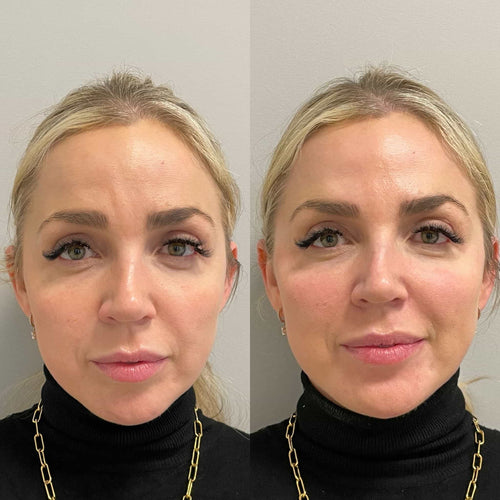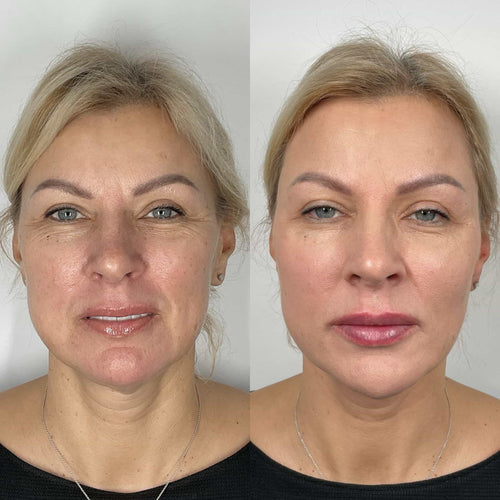Book a Dermal Filler Appointment with Dr. Laura Geige Today
Individuals With Certain Medical Conditions Bleeding Disorders
Autoimmune Diseases
Individuals with bleeding disorders are generally not good candidates for cheek fillers. This is because fillers are injected into the skin, and people with bleeding disorders may be more prone to bruising and bleeding at the injection site.

These individuals might experience prolonged or excessive bleeding after the procedure, increasing the risk of complications like hematoma formation (a collection of blood under the skin). It’s crucial for these patients to consult their doctor about alternative cosmetic options.
Autoimmune diseases can also pose a challenge when considering cheek fillers. Autoimmune disorders involve the body’s immune system mistakenly attacking its own tissues. This can lead to inflammation and rejection of foreign substances, such as filler material.
The risk of developing an inflammatory reaction or allergic response to fillers is higher in people with autoimmune diseases.
Therefore, individuals with a history of autoimmune disorders should discuss their suitability for cheek fillers with their physician. They may need to undergo additional testing and monitoring to ensure the safety of the procedure.
Active Infections
Individuals with certain medical conditions may not be suitable candidates for cheek fillers. These conditions can increase the risk of complications or reduce the effectiveness of the treatment.
Bleeding disorders, such as hemophilia, make it more likely for excessive bleeding to occur during and after the procedure. This can lead to bruising, swelling, and even hematomas (collections of blood under the skin). Patients with these conditions may need alternative cosmetic options or require special precautions during treatment.
Schedule a Dermal Filler Consultation with Dr. Laura Geige Now
Active infections, including those in the face or head region, also pose a significant risk for cheek filler injections. The injection site could become infected, leading to serious complications. It’s crucial to address any existing infections before considering fillers.
Other medical conditions that may make individuals unsuitable candidates for cheek fillers include autoimmune disorders, skin diseases affecting the treatment area, and uncontrolled diabetes.
It is essential to consult with a qualified and experienced physician specializing in dermal fillers. They will assess your individual medical history, evaluate your skin condition, and determine if cheek fillers are appropriate for you. Openly discussing any medical concerns or medications you’re taking will help the physician make an informed decision and ensure your safety.
Pregnant or Breastfeeding Women Hormonal Fluctuations
Potential Risks to the Baby
Pregnant and breastfeeding women experience significant hormonal fluctuations that can impact both their own health and the health of their developing baby. These fluctuations primarily involve estrogen, progesterone, and human chorionic gonadotropin (hCG).
While cheek fillers themselves don’t directly pose a risk to the fetus through transmission, the safety profile during pregnancy and breastfeeding is not fully established. The potential for unknown long-term effects on both mother and baby warrants caution.
The body’s increased sensitivity to medications and substances during pregnancy makes it crucial to avoid any unnecessary interventions that could potentially impact the developing fetus. Hormonal changes can also affect how fillers are metabolized, leading to unpredictable outcomes.

Furthermore, swelling and bruising associated with filler injections could be more pronounced during pregnancy due to hormonal changes in blood clotting and tissue sensitivity.
The American Society of Plastic Surgeons recommends avoiding elective cosmetic procedures like cheek fillers during pregnancy and breastfeeding until after these crucial periods have passed.
It is always best for pregnant or breastfeeding women to consult with their physician to discuss any potential risks associated with cosmetic procedures and make informed decisions about their health and the well-being of their baby.
People Taking Certain Medications Blood Thinners
Reserve a Consultation for Dermal Fillers with Dr. Laura Geige
Acne Medications
Individuals taking certain medications may not be ideal candidates for cheek fillers. Some medications can increase bleeding risk, interfere with how the body heals, or cause undesirable interactions with the filler material.
Blood thinners are a major concern. Medications like warfarin (Coumadin), heparin, aspirin, and newer antiplatelet drugs can all make it more difficult for blood to clot. This increases the risk of bruising, bleeding complications at the injection site, and even hematomas (collections of blood under the skin).
Acne medications are another category to consider. Some retinoids, such as isotretinoin (Accutane), can make the skin more fragile and sensitive to injections. This increases the chance of bruising, inflammation, or delayed healing.
It’s crucial for anyone considering cheek fillers to have a thorough conversation with their doctor about their current medications. This allows the doctor to assess potential risks and make informed recommendations. In some cases, adjusting medication dosages or temporarily discontinuing certain drugs may be possible, but only under strict medical supervision.
Always remember that your health and safety are paramount. Open communication with your healthcare provider is essential for ensuring a safe and successful cosmetic procedure.
Bend and Blossom Reimagining Journalism The CBD Consultancy
- Nu-Derm Skin System Near Longcross, Surrey - May 22, 2025
- Weed Drinks That Taste Like Real Cocktails - May 22, 2025
- Nefertiti Neck Lift Treatment Near Shepperton, Surrey - May 21, 2025
